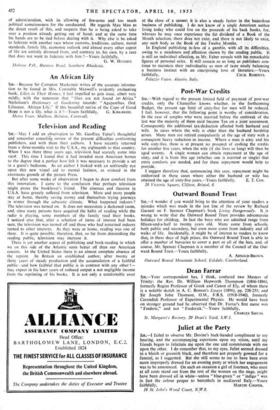Television and Reading
Sat,—May I add an observation to Mr. Geoffrey 'Faber's thoughtful and somewhat consoling review of the present difficulties confronting publishers, and with them their authors. I have recently returned from a three-months visit to the U.S.A., my eighteenth to that country. When I was there three years ago, television had scarcely come into view. This time I found that it had invaded most American homes to the degree that a perfect host felt it was necessary to provide a set in a guest's bedroom. As an author I looked with an unfriendly eye upon this new visual aid to mental laziness, as evinced in the enormous growth of the picture Press.
But after some weeks of observation I began to draw comfort from this innovation. I came to the conclusion that perhaps television might prove the booklover's friend. The cinemas and theatres in U.S.A. have gravely suffered from television. More and more people stay at home, thereby saving, money and themselves trying journeys in winter through the subarctic climate. What happened indoors ? The television was turned on. It does not necessitate a darkened room, and, since many persons have acquired the habit of reading while the radio is playing, some members of the family read their books. I noticed also that, after a selection of items, of interest had been seen, the television was turned off and those who had remained indoors turned to other interests. As they were- at home, reading was one of these. It is quite possible. therefore, that, so far from diminishing the reading public, television may increase it.
There is yet another aspect of publishing and book-reading in which we on this side of the Atlantic seem better off than our American cousins. In the United States there is an almost complete absence of the reprint. In Britain an established author, after twenty or thirty years of steady production and the accumulation of a faithful public—and how faithful that public is in contrast with any other !- may expect in his later years of reduced output a not negligible income from the reprinting of his books. It is-not only a comfortable asset at the close of a career; it is also a steady factor in the hazardous business of publishing. I do not know of a single American author living today who could live on the proceeds of his back books, for, whereas he may once experience the fit dividend of a BOok of the Month selection; there does not 'exist, and there is not likely to exist, any such body as the Book of the Twelve.Months. ' -
In England publishing is-less of a gamble, with all its difficulties, owing to a steadiness and affection shown by the reading public. It is still an individual affection, as Mr. Faber reveals with his remarkable figures of personal sales. It will-remain so as long as publishers con- tinue to maintain their individuality as men of taste nicely balancing a business instinct with an enterprising love of literature.—Yours Palazzo Vairo, Alassio, Italy.


































 Previous page
Previous page